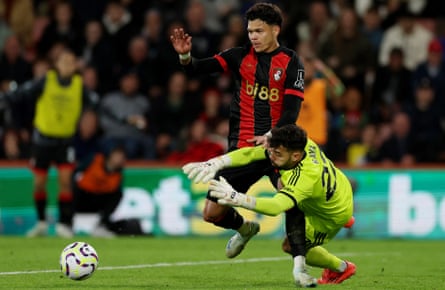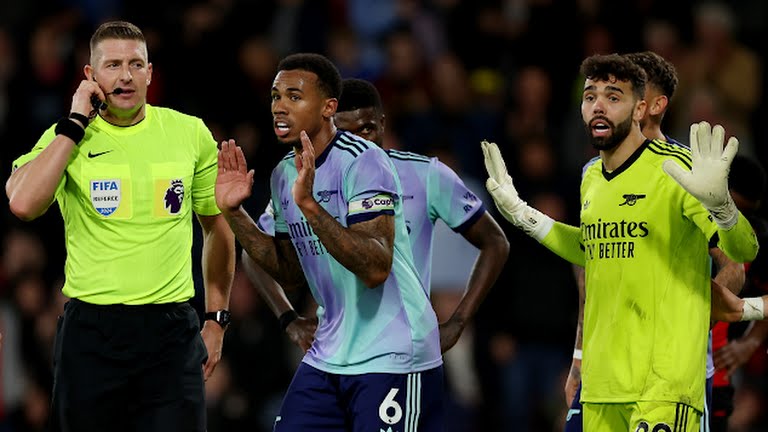This was not, for all that Arsenal fans will whine about conspiracies, about the refereeing decisions. It was not about the red card to William Saliba in the first half or about the penalty awarded in the second, profound though the impact of those decisions was. Rather it was about the extraordinary self-destructiveness that led to those decisions, the poor passes, the lack of discipline, the woolly-mindedness that so often afflicts Arsenal at key moments.
Perhaps the standards expected are unrealistic. This, after all, is a team that accrued 89 points last season – in historical terms, a huge number. In the old days, teams were allowed their slips. But that is not the modern world. When 90 points is effectively the minimum required to win the title, points cannot be given away like this if a team is to be regarded as a serious contender.
Arsenal succumbed, yet again, to their strange habit of making life difficult for themselves. Dramatic comebacks, late winners and nerve-jangling victories are all very well, but title-winning teams tend to have a number of routine victories, matches in which, without expending too much nervous energy, they rack up points almost unnoticed. Since beating Wolves on the opening weekend of the season, Arsenal haven’t had a single one of those. Before Saturday, they’d been the better side in every game apart from the draw at Manchester City, but whether they’re having players sent off, missing chances or conceding daft goals, every point seems to come with the absolute maximum of fuss. The storms can blow up from nowhere, unexpected but for the fact that this is Arsenal and that is what they do.
Without Martin Ødegaard and Bukayo Saka, Arsenal were always likely to lack creativity. Arsenal without Saka’s inswinging corner isn’t quite like Stoke without Rory Delap’s long-throws, but it is a weapon they miss, as was made obvious by the fact their first three corners of the game, taken by Declan Rice, were all outswingers; only 4.5% of Arsenal’s corners over the past three years have been outswingers. But they had seemed fine; Bournemouth weren’t threatening either. Almost nothing happened in the first half hour, the game as featureless as the pure autumnal evening sky. Then Leandro Trossard inexplicably sliced a pass in behind his own defensive line, William Saliba pulled back Evanilson and was, eventually, sent off.
None of it made any sense. What was Trossard doing – where was he trying to play it? Why would Saliba commit the foul when Evanilson still had half the pitch to run and he may have caught up with him? And even had Evanilson scored, with an hour still to play, Arsenal surely had more chance of winning the game from 1-0 down with 11 than at 0-0 with 10. And why did the referee, Robert Jones, initially show only a yellow card for what was as a clear a denial of a goalscoring opportunity as you’re likely to see (nothing in the law refers to how likely the forward is to take that opportunity)?
It was Arsenal’s third red card of the season – the first not for a second yellow earned by kicking the ball away – and the third game they have failed to win. Needless red cards are costing them.

Their fans may chant “cheat” and scream about corruption – Mikel Arteta, not usually slow to criticise officials, seemed notably accepting here, while Declan Rice spoke of “kicking ourselves in the foot” three times already this season – but errors tend to be punished. This was a defeat so self-inflicted that even the regulation under which Saliba was sent off was introduced in part as a response to the outcry about their centre-back Willie Young cynically fouling a youthful Paul Allen in the 1980 FA Cup final.
It got worse, as Jakub Kiwior’s weak backpass set Evanilson through to be tripped by David Raya for the penalty that brought the second goal. Two terrible backpasses, two fouls, a red card and a penalty; and it was all so avoidable, even before you consider the glorious chances missed by Mikel Merino and Gabriel Martinelli. That Bournemouth’s first stemmed from a corner only added salt to the wound.
They are a team seemingly unable to handle adversity. They could not hold on to a lead when Rice was sent off with 41 minutes remaining against Brighton. Although they made an extraordinary effort to preserve their lead with 10 men against City, in the end it wasn’t quite enough. It’s the same pattern, again and again. Soft goals conceded, opportunities squandered, inexplicable decisions. Rice spoke of “naivety” but whatever lies behind the sloppiness, if Arsenal ever are to win the title, it has to be eradicated.
Modern champions have to demonstrate an almost impossible consistency. That is hard enough without giving points away through little more than carelessness.








More Stories
Amorim insists Fernandes not leaving Manchester United amid Madrid reports
How debt burden pushed Nigerian boxer Segun Olanrewaju to a fight that took his life
Nigeria Taekwondo Federation boss, Abdullahi Saidu dies at 53